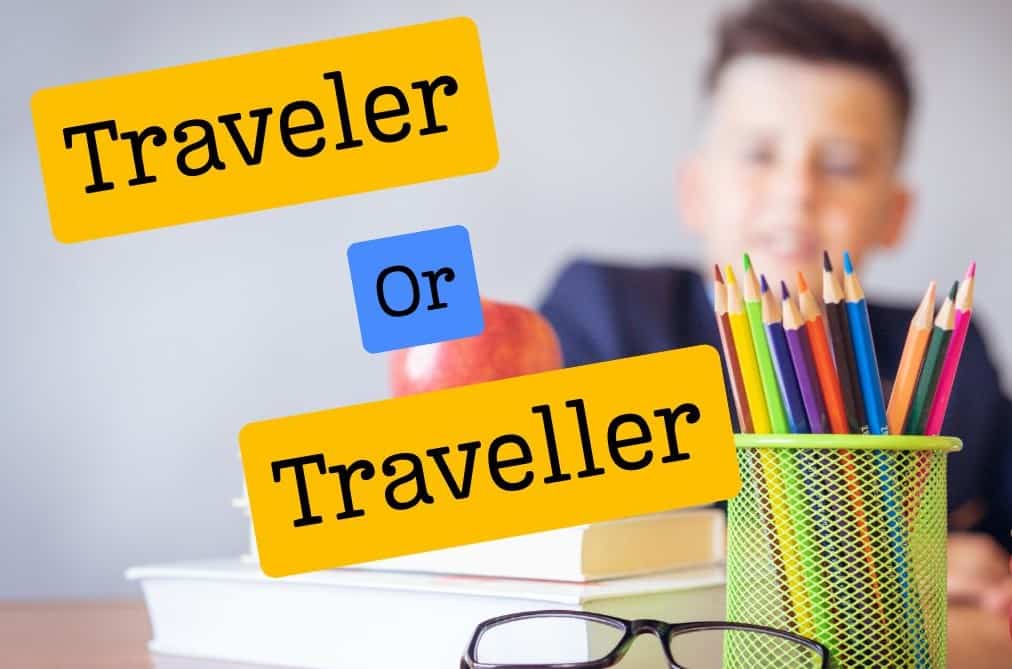Traveler or Traveller: Which Spelling Is Correct?
When writing the word for someone who journeys from place to place, you might ask: is it “traveler” or “traveller”? The answer depends on where you are in the world. This spelling difference is a classic example of American English vs. British English conventions.
In the United States, the correct spelling is “traveler” with one “l,” while in the United Kingdom and many other English-speaking countries, “traveller” with two “l’s” is preferred. Though the meaning remains the same, the variation in spelling can be confusing, especially for writers trying to maintain consistency in their work.
Understanding the nuances of these variations is crucial for clear and effective communication, whether you’re writing a formal essay, crafting a casual email, or simply trying to avoid grammatical errors. This article will delve into the intricacies of “traveler” vs ” traveler “. This guide benefits students, writers, and anyone seeking to improve their English language skills.
Definition of Traveler/Traveller
The word “traveler” or “traveller” refers to a person who travels, especially to distant places or foreign countries. It is a noun that describes someone undertaking a journey, whether for leisure, business, or any other purpose.
The core meaning remains consistent regardless of the spelling variation.
Classification and Function
“Traveler/traveller” functions as a common noun. Common nouns are general names for people, places, things, or ideas.
In this case, it’s a person. Grammatically, it can serve as the subject, object, or complement in a sentence.
Contexts of Use
The word appears in various contexts, from everyday conversations to formal writing. You might find it in travel guides, news articles, historical accounts, or even fictional stories.
The choice between “traveler” and “traveller” often depends on the intended audience and the regional spelling conventions being followed.

Structural Breakdown
The spelling difference between “traveler” and “traveller” stems from the rules of English morphology, specifically the handling of suffixes added to words ending in “-l.” The verb “travel” is the root word. When adding a suffix like “-er” (to form a noun denoting a person who performs the action), different spelling conventions come into play.
The Role of the Suffix “-er”
The suffix “-er” is commonly used to create nouns that describe someone who performs an action. For example, “teach” becomes “teacher,” and “write” becomes “writer.” The addition of “-er” to “travel” to form “traveler/traveller” follows this pattern.
Single ‘l’ vs. Double ‘ll’
The key difference lies in whether the final “l” in “travel” is doubled before adding the “-er” suffix. In some dialects of English, particularly British English, the “l” is doubled when the stress is not on the last syllable of the root word.
In other dialects, particularly American English, the “l” is not doubled.
Regional Differences
The preference for “traveler” or “traveller” is largely determined by geographical location. These differences reflect broader spelling variations between American and British English.
American English
In American English, the preferred spelling is “traveler.” This is consistent with a general tendency in American English to simplify spellings and avoid unnecessary double letters. Words like “color” (instead of “colour”) and “center” (instead of “centre”) follow a similar pattern of simplification.
British English
In British English, the preferred spelling is “traveller.” The doubling of the “l” is more common in British English when adding suffixes to words ending in “l,” especially when the stress is not on the final syllable. This rule applies to other words as well, such as “cancel” becoming “cancelled” in British English.
Other English-Speaking Regions
Other English-speaking countries, such as Canada and Australia, often follow British English spelling conventions and therefore tend to use “traveller.” However, there can be some variation, and the choice may depend on the specific publication or style guide being followed.
Examples of Traveler and Traveller
To illustrate the usage of “traveler” and “traveller,” here are several examples categorized by region and context. These examples will help to clarify when and where each spelling is most appropriate.
Examples in American English
The following table provides examples of “traveler” used in sentences that adhere to American English spelling conventions.
| Sentence |
|---|
| The weary traveler finally reached his destination. |
| She is a frequent traveler and has visited many countries. |
| The airline offers discounts for senior travelers. |
| He works as a travel agent, assisting travelers with their plans. |
| The museum had an exhibit on early American travelers. |
| As a seasoned traveler, she knew how to pack efficiently. |
| The sign directed travelers to the nearest rest area. |
| The company caters to business travelers. |
| He wrote a book about his experiences as a solo traveler. |
| The tour guide provided valuable information for the travelers. |
| The traveler’s backpack was filled with essential supplies. |
| She considered herself an adventurous traveler. |
| The website provided tips for budget travelers. |
| He met many interesting people while travelering in Europe. |
| The travel agency specializes in trips for the disabled traveler. |
| The experienced traveler always booked refundable flights. |
| The traveler was delayed due to the storm. |
| The traveler tried to find a place to sleep. |
| The traveler was happy to arrive. |
| The traveler was stopped at the border. |
| The traveler was tired and hungry. |
| The traveler was ready for a new adventure. |
| The traveler was carrying a big suitcase. |
| The traveler was trying to get home. |
| The traveler was enjoying the scenery. |
| The traveler was taking lots of photos. |
| The traveler was writing in a journal. |
| The traveler was sending postcards. |
| The traveler was buying souvenirs. |
| The traveler was learning a new language. |
Examples in British English
The following table provides examples of “traveller” used in sentences that adhere to British English spelling conventions.
| Sentence |
|---|
| The weary traveller finally reached his destination. |
| She is a frequent traveller and has visited many countries. |
| The airline offers discounts for senior travellers. |
| He works as a travel agent, assisting travellers with their plans. |
| The museum had an exhibit on early British travellers. |
| As a seasoned traveller, she knew how to pack efficiently. |
| The sign directed travellers to the nearest rest area. |
| The company caters to business travellers. |
| He wrote a book about his experiences as a solo traveller. |
| The tour guide provided valuable information for the travellers. |
| The traveller’s backpack was filled with essential supplies. |
| She considered herself an adventurous traveller. |
| The website provided tips for budget travellers. |
| He met many interesting people while travellering in Europe. |
| The travel agency specializes in trips for the disabled traveller. |
| The experienced traveller always booked refundable flights. |
| The traveller was delayed due to the storm. |
| The traveller tried to find a place to sleep. |
| The traveller was happy to arrive. |
| The traveller was stopped at the border. |
| The traveller was tired and hungry. |
| The traveller was ready for a new adventure. |
| The traveller was carrying a big suitcase. |
| The traveller was trying to get home. |
| The traveller was enjoying the scenery. |
| The traveller was taking lots of photos. |
| The traveller was writing in a journal. |
| The traveller was sending postcards. |
| The traveller was buying souvenirs. |
| The traveller was learning a new language. |
Examples in Canadian and Australian English
As mentioned, Canadian and Australian English often align with British English spelling. Therefore, “traveller” is generally preferred.
Here are some examples:
| Sentence |
|---|
| The Canadian traveller enjoyed the vast landscapes. |
| Australian travellers are known for their adventurous spirit. |
| This tour is designed for the
traveller seeking unique experiences. |
Usage Rules
To ensure clarity and consistency in your writing, it’s helpful to establish some guidelines for when to use “traveler” and “traveller.” These rules are primarily based on regional spelling conventions.
Rule 1: Know Your Audience
Consider who you are writing for. If your audience is primarily American, use “traveler.” If your audience is British, Canadian, Australian, or a mix of international readers, “traveller” might be more appropriate.
Rule 2: Consistency is Key
Whichever spelling you choose, maintain consistency throughout your document. Don’t switch between “traveler” and “traveller” unless there’s a specific reason to do so (e.g., quoting someone who uses a different spelling).
Rule 3: Adhere to Style Guides
If you’re writing for a publication or organization, consult their style guide. Many publications have specific guidelines on spelling preferences, and it’s important to follow them.
Rule 4: Consider the Context
In some cases, the context might influence your choice. For example, if you’re writing about American history, “traveler” might be more fitting, even if you’re writing for an international audience.
Common Mistakes
Even with a clear understanding of the rules, it’s easy to make mistakes when using “traveler” and “traveller.” Here are some common errors to watch out for:
Mistake 1: Inconsistent Spelling
Switching between “traveler” and “traveller” within the same document is a common mistake. Choose one spelling and stick to it.
Incorrect: The traveler enjoyed the trip, and the travellers found it very interesting.
Correct (American English): The traveler enjoyed the trip, and the travelers found it very interesting.
Correct (British English): The traveller enjoyed the trip, and the travellers found it very interesting.
Mistake 2: Applying the Wrong Regional Spelling
Using “traveller” in American English or “traveler” in British English is a common error. Be mindful of the regional spelling conventions.
Incorrect (American English): The American traveller enjoyed the trip.
Correct (American English): The American traveler enjoyed the trip.
Incorrect (British English): The British traveler enjoyed the trip.
Correct (British English): The British traveller enjoyed the trip.
Mistake 3: Overgeneralizing the Doubling Rule
The rule for doubling the “l” in British English applies specifically when the stress is not on the last syllable. Applying it incorrectly can lead to errors.
Practice Exercises
To reinforce your understanding of “traveler” and “traveller,” try these practice exercises. Fill in the blanks with the correct spelling based on the context provided.
1. The American _______ enjoyed the scenic route.
Answer: traveler
2. The British _______ booked a room in the hotel.
Answer: traveller
3. As a frequent _______, she had many stories to tell.
Answer (American English): traveler
Answer (British English): traveller
4. The Canadian _______ explored the national park.
Answer: traveller
5. The airline provides services for disabled _______.
Answer (American English): travelers
Answer (British English): travellers
Advanced Topics
For those interested in delving deeper into the nuances of English spelling, here are some advanced topics related to “traveler” and “traveller”:
The History of English Spelling Reform
Explore the historical movements aimed at simplifying English spelling. These movements have influenced the divergence between American and British English spellings.
Morphology and Suffixation Rules
Study the rules of English morphology, particularly how suffixes are added to words and how these rules vary across different dialects.
Regional Dialects and Spelling Conventions
Investigate the diverse regional dialects of English and their unique spelling conventions. This can provide a broader understanding of linguistic variation.
FAQ with Answers:
Is “traveler” or “traveller” more correct?
Both spellings are correct, but their usage depends on the region. “Traveler” is preferred in American English, while “traveller” is preferred in British, Canadian, and Australian English.
What about other words like “cancel” and “model”?
Similar to “travel,” the doubling of the final “l” in words like “cancel” and “model” depends on the regional spelling conventions. In British English, you would write “cancelled” and “modelling,” while in American English, you would write “canceled” and “modeling.”
Should I use “traveler” or “traveller” in a global context?
If you’re writing for a global audience, consider the primary readership or the conventions of the publication. If there’s no specific guidance, “traveller” might be a safer choice as it is more widely accepted internationally.
Does the spelling affect pronunciation?
No, the spelling difference does not affect the pronunciation of the word. Both “traveler” and “traveller” are pronounced the same way.
Conclusion
The choice between “traveler” and “traveller” ultimately depends on regional spelling preferences. “Traveler” is the standard spelling in American English, while “traveller” is preferred in British English and often in Canadian and Australian English.
By understanding these regional differences and adhering to consistent spelling practices, you can ensure clarity and accuracy in your writing. Whether you’re an experienced writer or simply looking to improve your English language skills, mastering these nuances will enhance your communication and credibility.





